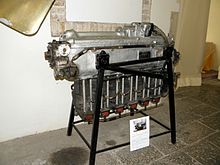Alfa Romeo 115
| Alfa Romeo 115 | |
|---|---|

| |
| Alfa Romeo 115 | |
| Type | Piston aircraft engine |
| Manufacturer | Alfa Romeo |
| First run | 1930s |
| Number built | 115 ~1,600 |
The Alfa Romeo 115 is an Italian six-cylinder air-cooled inverted inline engine for aircraft use, mainly for training and light planes, based on the de Havilland Gipsy Six engine. Production totalled approximately 1,600 units. Derivatives of the 115 include the -1, bis, ter and Alfa Romeo 116.[1]
Description
The Alfa Romeo 115 series of engines closely follows the original de Havilland Gipsy Six engines in having one-piece Elektron casting crankcases with cover plates, steel cylinders, finned for cooling, and detachable aluminium alloy cylinder heads. The six-throw one-piece counterbalanced crankshaft is carried in seven plain journal bearings and the propeller is driven directly by the crankshaft.
Variants
- 110ter
- 4-cylinder version of the 115ter
- 115-1 (115-I)
- 115bis (115-2 / 115-II)
- 115ter (115-3 / 115-III)
- 116-1 (116-I)
- The 115 bored out to 120 mm (4.72 in) developing 160 kW (220 hp) at 2,360 rpm, otherwise similar.[1][2]
Applications
- Ambrosini SAI.2S (115-1)
- Ambrosini SAI.3
- Ambrosini S.7 (115ter)
- Bestetti BN.1 (one prototype)
- Breda Ba.79S
- CANT Z.1012 (or 110)
- Caproni Ca.164
- Caproni Ca.309 Ghibli (115bis)
- Fiat G.46-1B (115bis)[3]
- Fiat G.46-3B (115bis)
- Fiat G.46-4B (115bis)
- Fiat G.46-A (115ter)
- Fiat G.46-3A (115ter)
- Fiat G.46-4A (115ter)
- Nardi FN.305
- Nardi FN.315
- Saiman 200
Specifications (115-1)

Data from Jane's All The World's Aircraft 1938,[2] Italian Civil and Military aircraft 1930–1945,[1] and Aircraft Engines of the World 1945 [4]
General characteristics
- Type: Six-cylinder inverted air-cooled inline engine
- Bore: 118 mm (4.65 in)
- Stroke: 140 mm (5.51 in)
- Displacement: 9.187 L (560.6 cu in)
- Length: 1,642 mm (64.65 in)
- Width: 498 mm (19.6 in)
- Height: 825 mm (32.5 in)
- Dry weight: 210 kg (463.0 lb)
- Frontal Area: 0.35 m2 (3.8 sq ft)
Components
- Valvetrain: Two valves per cylinder, sodium-cooled exhaust valves
- Fuel system: Two Mona-Hobson AI48D downdraught carburettors with mixture control
- Fuel type: 73 octane
- Oil system: 2.8–3.1 bar (40–45 psi), dry sump with one pressure and three scavenge pumps.
- Oil consumption: 0.01095 kg/(kW h) (0.018 lb/(hp h))
- Cooling system: Air-cooled
- Reduction gear: Direct drive
- Starter: Hand starter
- Ignition: 2 x Marelli magnetos, 2 x spark plugs per cylinder.
Performance
- Power output:
- Maximum power: 153 kW (205 hp) at 2,350 rpm
- Normal: 145 kW (195 hp) at 2,200 rpm
- Cruising: 100 kW (140 hp) at 1,500 rpm
- Compression ratio: 6.5:1
- Specific fuel consumption: 0.322 kg/(kW h) (0.53 lb/(hp h)) (take-off)
- Oil consumption: 0.011 kg/(kW h) (0.018 lb/(hp h))
- Power-to-weight ratio: 0.727 kW/kg (0.4425 hp/lb)
See also
Comparable engines
Related lists
Notes
- ^ a b c Thompson, Jonathan W. (1963). Italian Civil and Military aircraft 1930–1945. USA: Aero Publishers Inc. p. 295. ISBN 0-8168-6500-0. LCCN 63-17621.
- ^ a b Bridgman, Leonard, ed. (1938). Jane's All The World's Aircraft 1938. London: Sampson Low and Marston Co. Ltd. pp. 67d–68d.
- ^ "Fiat G.46 4B". pilotfriend.com. Archived from the original on 27 September 2007. Retrieved 2007-08-28.
- ^ Wilkinson, Paul H. (1945). Aircraft engines of the World 1945 (2nd ed.). New York: Paul H. Wilkinson. pp. 284–285.
References
- Bridgman, Leonard, ed. (1953). Jane's All The World's Aircraft 1953-54. London: Jane's.
- Gunston, Bill (1986). World Encyclopedia of Aero Engines. Wellingborough: Patrick Stephens. p. 9.
- Bridgman, Leonard, ed. (1938). Jane's All The World's Aircraft 1938. London: Sampson Low and Marston Co. Ltd. pp. 67d–68d.
